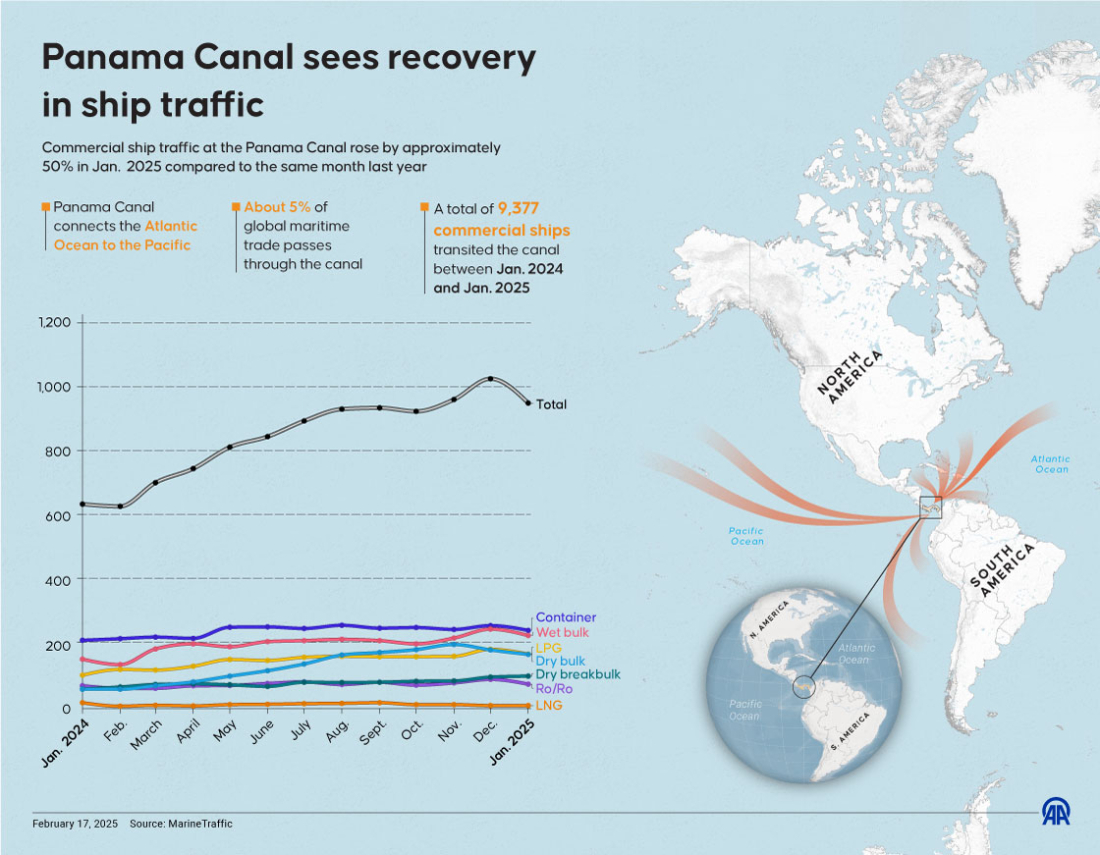Balcazar elected as Peru’s interim president
Peruvian lawmakers elected Jose Balcazar as the country's new interim president on Wednesday ahead of general elections in April....
Panama City, Panama, February 18, 2025 – Vessel traffic through the Panama Canal rebounded significantly in January, with data showing an almost 50% year-on-year increase.
Eased weather conditions and improved draught levels have contributed to a recovery in transits, as 632 commercial vessels passed through the strategic waterway daily, bringing the total to 9,377 for January 2024-25.
The recovery was marked by notable increases across several vessel categories. Container ship traffic rose 15%, while liquid bulk cargo vessels increased by 50% to 221 transits. Dry breakbulk cargo shipments saw a surge of 205%, reaching 162 transits. In contrast, LNG traffic declined slightly by 2%, with 11 LNG ships recorded—a downturn linked to shifting energy supply patterns following Europe’s pivot toward US LNG amid ongoing geopolitical tensions.
Despite these gains, overall vessel traffic remains below the 2019–2022 average, as the canal continues to navigate challenges posed by climate-related fluctuations in water levels.
The canal, which serves as a vital link between the Atlantic and Pacific Oceans and ranks as the world’s second largest trade route with over 10,000 annual transits, remains predominantly used by the United States, accounting for 52% of ship traffic. Other major users include China - handling roughly a quarter of US cargo - along with Chile, Japan, and South Korea.

In a separate development, former US President Donald Trump made headlines by suggesting that the United States might consider reclaiming control of the canal. During a press conference, Trump remarked, “We didn’t give it to China. We gave it to Panama, and Panama has been ripping down all the Chinese language signs,” adding that the US should take action. His comments come amid broader discussions about Chinese influence in global trade routes, although the Panama Canal has been under Panamanian control since 1999 following a series of agreements that transferred US operational rights over the years.
Originally constructed under the Roosevelt administration and operated by the United States until a joint management arrangement began in 1977, the canal was fully handed over to Panama in 1999. Trump’s remarks have sparked controversy, as the canal’s governance and sovereignty are well established under Panamanian law.
As the canal’s vessel traffic continues to recover, analysts note that while weather-related challenges are easing, the long-term impact of climate change on canal operations remains a key concern for global trade stakeholders.
The drumbeats have finally faded at the Marquês de Sapucaí, bringing the competitive phase of the Rio Carnival 2026 to a dazzling close. Over two marathon nights of spectacle, the twelve elite schools of the "Special Group" transformed the Sambadrome into a riot of colour.
Peru’s Congress has voted to censure and remove José Enrique Jeri Ore from his posts as President of Congress and acting President of the Republic, just four months into his tenure, citing undisclosed meetings with Chinese businessmen and alleged hiring irregularities.
France celebrated Olympic gold in the men’s biathlon relay in Anterselva on Tuesday (17 February), following a thrilling race marked by an electric atmosphere at the stadium.
Qarabağ FK are facing Newcastle United in the UEFA Champions League play-off round on Wednesday evening in Baku, in what will be the first UEFA competition meeting between the two clubs.
Iranian officials say more than 300 undocumented Afghan migrants have been rescued after being stranded in cold and rain near the border district of Taybad, in the northeastern Razavi Khorasan province.
Peruvian lawmakers elected Jose Balcazar as the country's new interim president on Wednesday ahead of general elections in April.
The Telegram messaging app has dismissed allegations by the Russian government that its encryption has been breached by foreign intelligence services saying that it's not found any breaches of its encryption.
A South Korean court on Thursday sentenced ex-President Yoon Suk Yeol to life in prison for leading a failed 2024 martial law insurrection, making him the first elected leader in the country’s democratic era to receive the maximum sentence.
Russian President Vladimir Putin met Cuban Foreign Minister Bruno Rodriguez in the Kremlin on Wednesday, telling him that new restrictions imposed on the communist-run island were unacceptable.
The Board of Peace is entering uncharted territory, with questions over its ability to manage Gaza reconstruction, its potential to rival the United Nations, and its impact on strategic allies in the Middle East and South Caucasus.
You can download the AnewZ application from Play Store and the App Store.

What is your opinion on this topic?
Leave the first comment